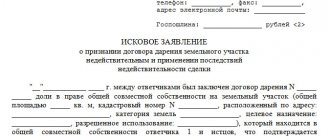According to the Civil Code of the Russian Federation, the parties are free to enter into deeds of gift (Article 421 of the Civil Code of the Russian Federation). Coercion to give or accept a gift is illegal . However, from the moment of proper execution, the deed of gift comes into force and becomes binding on the parties, as stated in Art. 425 of the Civil Code of the Russian Federation (Civil Code of the Russian Federation).
For your information
A gift is a unilaterally binding contract. The donor plays the main role in its execution. The method of implementation depends on the type of agreement: real or consensual .
With a regular donation, the moment of concluding the contract and transferring the thing coincide in time . Moreover, in the case of an oral donation of movable property, the execution of the gift agreement is the only and sufficient evidence of its conclusion (Part 2 of Article 574 of the Civil Code of the Russian Federation).
The consensual type of gift involves a written promise to transfer some benefit to the counterparty in the future . At the moment of concluding a transaction, an obligatory relationship arises in which the donor is the debtor and the donee is the creditor.
The moment of fulfillment of the gift promise can be determined:
- reference to a calendar date;
- events that will inevitably come;
- events that are likely to happen.
In the latter case, the deed of gift is considered completed under a condition (Article 157 of the Civil Code of the Russian Federation).
The execution of the contract, at the request of the parties, can be confirmed by an act of acceptance and transfer . This document is evidence of the transfer of things/documents and the parties’ absence of claims against each other.
How does cancellation work?
The gift agreement can be canceled and terminated (according to Articles 577 and 578 of the Civil Code of the Russian Federation).
A deed of gift for an apartment can be revoked in court if there were violations of current legislation during its conclusion. An agreement may be invalid due to illegal content, an unspecified form, the inability of the donor for various reasons to enter into such transactions, or inconsistency with the will of the donor.
A contract can only be challenged in court, and its nullity is recognized by virtue of a direct indication of this in the law.
The possibility of canceling a deed of gift protects the rights of the donor . That is, the gift agreement has retroactive force, but this requires compelling reasons. You cannot simply cancel a gift agreement at will.
Is withdrawal allowed after state registration?
A deed of gift after state registration of property rights can be canceled in court if the fact of an attempt on the life of the donor (members of his family) or harm to health is proven.
The donor may revoke the agreement after registering the rights to the apartment and if he proves that the recipient of the gift poses a threat of destruction of the property.
It is possible to revoke a contract without the participation of a court if the recipient of the gift died before the donor, and if two conditions were met:
- this nuance was stated in the clause in the agreement;
- Until the moment of death, the recipient of the gift was the owner of the apartment (that is, the gift was not transferred or sold).
Nullity of the transaction
Canceling the deal is not the only option to resolve this issue. In accordance with the provisions of the law, it is possible to achieve recognition of the agreement as void. For this to happen, the contract must have certain characteristics, namely:
- absence of essential conditions in the text;
- the text of the agreement makes the obligations and rights of both parties to the agreement unclear;
- the subject of the transaction is not described in it;
- the clauses of the contract do not comply with current legislation.
A transaction can also be characterized as a sham, for example, when the contract hides the act of buying and selling property. An agreement is considered void even in cases where it is concluded between incapacitated persons, as well as if it concerns property that is subject to certain restrictions, for example, arrest.
Deadlines for revoking deed of gift
Under voidable contracts, which include donation, in accordance with Art. 181 of the Civil Code of the Russian Federation, the limitation period for recognition of invalidity is one year (from the date of cessation of the threat or violence).
If a gift agreement is recognized as void, the limitation period is three years (Article 181 of the Civil Code of the Russian Federation).
When the statute of limitations for challenging a deed of gift begins to count depends on who files the lawsuit.
- If the donor, under the influence of violence, entered into a donation agreement, then this transaction can be declared invalid by filing a lawsuit within a year from the date the violence ceased.
- If a third party learns of a violation of its rights, then the period for filing a claim is three years from the date of discovery of the violation.
The statute of limitations may be reinstated or suspended under certain circumstances.
Who has the right to terminate the agreement?
, as well as third parties, can terminate the gift agreement
Donor
The donor can cancel the donation transaction if the donee has made an attempt on his life or the life of close relatives. Intentional infliction of bodily harm is also grounds for termination of the contract.
The second reason for canceling the deed of gift is the commission by the recipient of the gift of actions that create the threat of irretrievable loss of the apartment (Article 578 of the Civil Code of the Russian Federation).
Only the donor himself can cancel a donation for this reason. Heirs do not have such a right.
If the donee dies before the donor, the latter has the right to revoke the gift.
The donor has the right to refuse the gift agreement if the agreement was concluded for the future. According to Art. 577 of the Civil Code of the Russian Federation, the donor can make such a decision if life circumstances have changed significantly after the conclusion of the contract, and the execution of the contract will lead to a significant decrease in his standard of living.
Recipient
Legislatively, the right of the donee to refuse a gift is enshrined in Art. 573 Civil Code of the Russian Federation. The refusal can be formalized by a deed of gift to the former owner or by concluding an agreement to cancel the gift agreement.
The easiest way is to refuse the gift before or during the conclusion of the deed of gift.
If the recipient wanted to return the donated apartment, how to return it back to the donor after signing the agreement, when he does not agree? To resolve this conflict they go to court.
Third parties
Third parties include parties whose interests were infringed as a result of the transaction (this could be government agencies or other family members).
On the part of guardianship authorities or investigative authorities, a real estate donation transaction may be canceled for the following reasons:
- The gift agreement was not registered with the Federal Registration Service.
- A mandatory condition (the transaction is free of charge) has been violated.
- The agreement contains a clause on the transfer of ownership after the death of the donor. Read more about whether it is possible to challenge a deed of gift after the death of the donor and who has the right to do so here.
- The information provided in the contract contains errors.
- In the drawn up agreement there is no signature of one of the parties (donor or donee).
- A gift agreement infringes on the rights of a minor or incapacitated person.
Cancellation of a donation may occur on the basis of a claim by interested persons or relatives of the donor.
It is possible to submit a request to cancel a donation if:
- the recipient of the gift committed actions that led to the death of the donor;
- At the time of concluding the donation agreement, the donor was incapacitated.
Third parties can challenge the deed of gift only in court.
Procedure for executing a gift agreement
The main procedural aspects of the implementation of donation are written out in Chapter. 32 of the Civil Code of the Russian Federation. One should also take into account the general rules on transactions and rules for the acceptance and transfer of property of various types.
Art. 574 of the Civil Code of the Russian Federation specifically regulates the procedure for transferring property under an oral gift agreement with a real structure. The reason for the detailed regulation is that in the absence of a written deed of gift, the fact of proper transfer is confirmed by the conclusion of the transaction.
Important
The execution of a deed of gift is the transfer of property or title documentation for it. Transfer is possible personally to the donee or his legal representative.
General provisions on the transfer of the subject of the transaction are stipulated in Art. 224 Civil Code of the Russian Federation. Proper transfer of property is, among other things, recognized as:
- its shipment to the carrier for shipment;
- transfer to the post office for forwarding.
If at the time of the donation the subject of the transaction was already in the possession of the donor (for example, in a lease), the thing is considered donated from the moment the deed of gift is signed .
Special rules for the transfer of rights under documentary and uncertificated securities are established by Art. Art. 146, 149.1 Civil Code of the Russian Federation. The delivery of title documents, for example, a bill of lading, part 3 of Art. 224 Civil Code of the Russian Federation.
Although according to the logic of Chap. 32 of the Civil Code of the Russian Federation, donation is carried out by transfer of property; the legislator did not indicate the obligation to draw up an act of acceptance and transfer even regarding real estate. For comparison, the performance of duties by the real estate seller is confirmed by this document (Article 556 of the Civil Code of the Russian Federation).
A deed of acceptance and transfer can be drawn up by the parties when donating any property, regardless of the type of transaction. The document is especially relevant for legal relations of gift of consensual type.
A gift promise can only be made in writing . By executing an agreement without supporting documents (deed, receipt, cash receipt order), the donor is defenseless against an unscrupulous recipient. The latter may deny the fact of fulfillment of the gift promise and demand a repeated donation.
Attention
The deed of gift for real estate must be registered in the Unified State Register. Participation (personal or through a representative) in the state registration procedure is also the fulfillment of the obligations of the parties to the deed of gift.
If one of the counterparties evades state registration of the deed of gift, the second party has the right to file a claim against the Rosreestr authority . If they win, the court will oblige officials to carry out registration without the participation of the evading party (Article 165 of the Civil Code of the Russian Federation).
Revocation of the decision by the donor
Most often, the initiator of the revocation of the deed of gift is the donor. The donor can cancel his decision pre-trial or through the court.
Pre-trial
To avoid litigation, both parties to the contract should not object to the termination of the transaction. To document the decision, you will need a notary who will draw up a new document. In such situations, the recipient of the gift writes a deed of gift to the donor.
If the first gift agreement contained a clause indicating the possibility of terminating the agreement with mutual consent of the parties, then it is possible to draw up not a new gift deed, but a termination of the agreement.
In court: step-by-step instructions
If the parties do not reach an agreement, then they need to go to court. The main task of the plaintiff will be to provide evidence that the court would consider significant.
Jurisdiction
The claim must be filed in the court that has jurisdiction over the defendant. The plaintiff can choose jurisdiction independently if the defendant’s place of residence is unknown (Article 29 of the Code of Civil Procedure of the Russian Federation). A claim regarding termination of the deed of gift can be filed at the location of the apartment or at the last known place of residence of the defendant in the Russian Federation.
If the claim concerns several defendants at once, then the claim can be filed at the residential address of one of the defendants.
Documentation
To file a claim in court, you will need the following documents:
- statement;
- donor's passport;
- copy of the deed of gift;
- an extract from the register confirming the transfer of ownership to the recipient of the gift;
- evidence confirming the validity of the claim;
- bank statement confirming payment of state duty.
Filing a claim
When filing a claim, indicate:
- name of the court to which the appeal is sent;
- full information about the plaintiff and data about the defendant;
- the exact wording of the requirement (to invalidate the contract or terminate the agreement);
- cost of claim;
- evidence, circumstances and justification (what causes the claim);
- documents confirming these facts.
We do not recommend completing the documents yourself. Save time - contact our lawyers by phone:
8 (800) 302-76-94
Proof
In order for the court to invalidate the deed of gift, significant evidence must be presented. This can be witness testimony, certificates, medical reports, extracts, video recordings.
To recognize a gift transaction as void, you can provide a receipt for the transfer of money to the donor from the donee. Evidence may be the testimony of lawyers, notaries to whom the parties turned for help, or witnesses to the transaction.
If the transaction is disputed due to violence against the donor, then statements of a corresponding nature to the local police officer or the police, SMS messages, letters can serve as evidence.
Duration and cost of the procedure
After receiving the claim, the judge must make a decision within five days to consider the case or to refuse to consider the case.
The institution of first instance has the right to consider civil disputes within two months. The dissenting party can then appeal. Such proceedings may drag on for several months. Therefore, you need to ask whether the decision has been reversed.
The cost of legal support services starts from 10,000 rubles. State registration of a new agreement will cost the applicant 2,000 rubles, and issuing a certificate will cost 200 rubles.
If the plaintiff demands that the transaction be declared invalid, then a state fee of 300 rubles is paid. If you had to go to court to return the property, then according to Art. 333.24 of the Tax Code of the Russian Federation, you will need to pay a state duty in the amount of 13,200 rubles. plus 0.5% of the excess of 1 million rubles, but not more than 60,000 rubles. (if the value of the claim is more than 1 million rubles).
Going to court
A claim is a petition filed in court. The donor has the right to do this independently, or by turning to the services of specialists. The form of the application and its content are determined by the Civil Code; it is impossible to deviate from its requirements. The header of the application indicates the exact name of the authority to which the application is sent and information about the applicant. What follows is a description of the circumstances of the case and the basis for filing the claim, as well as steps, if any, taken for pre-trial settlement.
Finally, the requirements for the defendant and the list of documents attached to the claim are reported. All contact information of both parties must be indicated in full, clearly and accurately. Within five working days from the date of filing the application, the judge who will deal with this case must be determined, and it is he who must initiate the trial of the case.
Can the new owner return the living space?
You can return the gift back if the recipient changes his mind for some reason about becoming the owner of the home. There can be many reasons:
- reluctance to aggravate the situation with the relatives of the generous donor;
- the apartment is donated with an encumbrance (debts, credit, there is a right of lifelong residence of other people);
- emergency condition of housing;
- doubts regarding the donor’s legal capacity;
- conflict between the donor and the recipient;
- inability to pay taxes and maintain the apartment in the future;
- Some donors deprive relatives of their inheritance this way, and recipients refuse for moral reasons.
According to Art. 573 of the Civil Code of the Russian Federation, the donee is not obliged to provide the reason for refusing the gift.
Grounds and conditions for cancellation of the agreement
The legislation clearly states the reasons why the donor of an apartment can abandon his intentions. Regarding the donee who wants to return the gift, the legislation does not impose such requirements.
If before the moment of refusal of the gift the gift agreement was not registered, then it will not be difficult to refuse the gift.
The gift agreement is considered executed after registration of the donee's ownership of the real estate. According to Art. 578 of the Civil Code of the Russian Federation, in case of cancellation of the donation, the gift must be returned in the condition that was at the time of donation.
Cancellation periods before and after registration
The donee has the legal right to refuse the gift before the transaction is completed. Regarding real estate, this is the period until the deed of gift is registered in Rosreestr. Before registering property rights, it is enough to go to the notary who certified the donation agreement and declare the need to draw up a new document. In this case, the donor’s consent is not required for refusal.
If the donee refuses the gift after registration of ownership in Rosreestr, then it is necessary to obtain the consent of the donor (preferably in writing) to cancel the transaction. When a compromise is reached, the parties enter into a new agreement, which is registered in Rosreestr.
Step-by-step return instructions
- If the return of real estate occurs before the registration of the deed of gift in Rosreestr, then the donee only needs to issue a written refusal. The application contains the donor's details and information about the apartment. Then the refusal is certified by a notary.
- If the deed of gift for the apartment has already been registered, then the recipient must also write a refusal of the gift, then the donor and donee confirm the termination of the gift with a notary. Then the parties contact Rosreestr.
In cases where one of the parties to the gift agreement does not agree with the termination of the agreement, the issue is resolved through the court.
Where to start and where to go?
The recipient of the gift must contact the donor with a written request to terminate the deed of gift. If the donor’s consent is obtained, then the notary certifies the agreement to terminate the previous contract.
Documentation
To return the apartment, the recipient of the gift must:
- original agreement;
- passports of the donor and recipient;
- certificate from the Unified State Register of Real Estate;
- certificate of number registered;
- consent of the remaining members of the recipient of the gift to cancel the deed of gift;
- bank document confirming payment of state duty;
- deed of appraised value.
Timing and cost
According to Art. 333.24 of the Tax Code of the Russian Federation, the fee for notary services for certifying agreements that require a notarial form in accordance with the law is 200 rubles.
If one of the parties to the donation agreement files a lawsuit, then you will have to pay a state fee in the amount of 13,200 rubles. plus 0.5% of the excess of 1 million rubles, but not more than 60,000 rubles. (if the value of the claim is more than 1 million rubles).
the reverse transfer of ownership of an apartment within a week. But this is the simplest and fastest option if there is agreement between the parties. Litigation lasts much longer; the court has the right to consider the case within two months. Therefore, it is worth asking whether the gift agreement was canceled and whether the property was returned.
In legal practice, there are situations in which relatives challenge or cancel apartment donation transactions. We advise you to read the articles of our experts about what are the grounds and in what cases can you challenge a deed of gift during the life of the donor and after his death.
Required documents
Let's look at the basic set of documents required in case of returning a donated apartment:
- statement;
- deed of gift;
- passports of both parties;
- extract from the Unified State Register;
- certificate about the number of people registered in the apartment;
- permission of the residents for the previously drawn up deed of gift to be cancelled;
- check for payment of state duty;
- documents for the object of donation (cadastral passport, certificate of appraised value);
- power of attorney (if a representative of one of the parties participates in the transaction).
In different cases, additional paperwork may be required.
You can submit documents at Rosreestr or at the MFC. Papers can be brought in person, sent by mail or via the Internet (if you have an electronic signature). But the fastest option would be the personal presence of both parties at the registration authority.
Is it possible that the property cannot be returned?
The most common reason for refusing to cancel a deed of gift is a change in the owner of the apartment. If the donee has already exercised his right to dispose of the apartment (donated it, sold it, etc.), it will be very difficult to return the property to the donor.
The agreement to terminate the deed of gift should not have two-valued interpretations or conventions. Otherwise, Rosreestr has the right to refuse registration of documents.
The court has the right to refuse the donor or donee in the absence of grounds (strong evidence) to cancel the agreement. If the court of first instance refuses the plaintiff, then if there is strong evidence, it is worth seeking the truth in the higher courts by filing an appeal.
The law reserves for the donor the right to cancel the deed of gift in order to protect his interests in the event of malicious ingratitude of the recipient of the gift. But the desire to “annoy” the donee alone will not be enough to cancel the contract.
If there is mutual agreement to terminate the contract, there will be no problems with canceling the deed of gift. But judicial practice shows that cases of reaching a compromise in real estate matters are very rare.
Arbitrage practice
Case No. 1. Transferring an apartment as a gift to a granddaughter.
The plaintiff tried to cancel the contract on the basis of the fact that the donation took place under pressure from relatives. In exchange, they were expected to receive material and medical assistance, as well as the maintenance of the donated home. The statement contained a statement that the recipient of the apartment deprived the donor of the opportunity to live peacefully in the apartment. On this basis, a claim was filed and a demand was made to terminate the contract. The applicant justified her intentions by the fact that after the death of her husband she was in a depressed psychological state and did not realize the real consequences of her actions.
The defendant completely denied the claims and won the case, since the plaintiff was unable to prove during the proceedings that the facts of other people’s influence she cited actually took place.
Case No. 2. Transfer of an apartment as a gift to a cousin.
The recipient of the apartment was childless and had a bad relationship with his wife, so the contract included a clause on the possibility of canceling the transaction. The donor went abroad for two years; upon returning to Russia, he learned that his brother had died, his wife inherited the apartment and managed to sell it.
Based on the agreement and its contents, he filed a lawsuit demanding the return of the apartment or reimbursement of its cost. The court decided to satisfy the claim and ordered the defendant, who ignored the subpoenas, to reimburse the cost of the apartment to the applicant.





